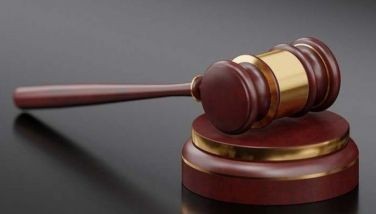BIR provides 'rich broth' for corruption
(First of three parts)
Certified public accountant Boni Santos (not his real name) prided himself in keeping his company's books in order. But a Bureau of Internal Revenue (BIR) examiner said his firm, a fastfood franchise, had racked up some P3 million in tax deficiencies.
Santos arranged a meeting with the tax officer at a nearby restaurant. Convinced that his company's records could stand scrutiny, Santos asked the examiner to take a closer look at its books. The BIR man, however, refused to do so, and instead insisted that his assessment was correct. Santos recalls being told in the process, "You're deficient here, you're disallowed here."
Santos says the meeting, which took place several years ago, was his first encounter with a BIR examiner. To this day, he insists, "We were paying taxes honestly." But he says he still found himself haggling with the examiner. In the end, his firm agreed to pay a pared down "assessment" of P320,000. Of this, only P20,000 appeared on the receipt handed to Santos; the rest ended up with the examiner and his friends.
Paying taxes is a chore no one relishes doing, which is partly why many people usually wait until the deadline to file their income tax returns - today, for tax year 1999 - and why no one expects the BIR to reach its target collection of P387.8 billion for this year.
But even BIR insiders say a major reason why taxpaying has become so onerous a task in this country is because of the widespread perception that the bureau is corrupt, and that much of the money a taxpayer hands over goes not to the government but into the pockets of unscrupulous BIR officers. The insiders also say tax audits such as the one undergone by Santos' former employer provide one of the lucrative opportunities for corruption in the bureau, and have become tools of harassment by BIR personnel.
Several BIR officials, both past and present, interviewed for this series by the PCIJ confirm that too many flaws in the system have made the practice of rigging tax assessments all too common. For instance, they say, the procedure for the conduct of tax assessment is unclear.
There is also too much discretion left in the hands of BIR examiners. "There's a lot of expenses that they can disallow," says one businessman, referring to the alleged arbitrary manner by which examiners forbid certain company expenses from being deducted from the taxable income, raising the tax due. "That's why," he adds, "you negotiate."
The delineation of functions among various BIR units is vague as well, which means a company can be audited by the tax fraud division of the national office and a revenue district office for the same taxable period - supposedly a no-no based on BIR guidelines.
Worse, there is hardly any monitoring being done to check any abuse. Not by the Commission on Audit or by Congress anyway, much less by BIR top officials, some of whom may even be accomplices to this malfeasance. And while there have been attempts to reform the system and at least limit the abuses, there is apparent resistance from within. Remarks Romulo Neri, director-general of the Congressional Planning and Budget Office (CPBO): "It is a very rich broth for corruption to thrive."
A recent study by the Transparency International (Philippines) in fact shows that for every P2,000 tax collectible, only P1,000 is actually collected because P500 goes to corruption and collusion, while the remainder goes to "defects" in collection.
But these figures may even be generous. According to an examiner at the Bureau's tax fraud division, 50 percent of assessed deficiencies or tax liabilities going to public coffers is already considered huge. Other BIR insiders confirm this, saying that whenever there is collusion between revenue personnel and business taxpayers in particular, the liabilities could be reduced by as much as 90 percent, which leaves a measly 10 percent for the government purse.
The irony is that tax audits are supposed to be conducted precisely to enhance voluntary tax compliance and encourage the correct reporting of taxes.
Not all tax returns, of course, are supposed to be subjected to audit. Under BIR's 1999 Audit Program for revenue district offices (embodied in Revenue Memorandum Order No. 67-99), which took effect on Sept. 1, 1999, there are two categories of selection criteria for the 1998 internal revenue tax returns to be audited: mandatory and priority target taxpayers. Included in the first category are estate/donors tax returns with a gross estate/gift above P5 million, and claims for tax credit/refund exceeding P20,000 and with gross sales/receipts exceeding P5 million.
Among the priority target taxpayers, meanwhile, are those who did not avail of the Economic Recovery Assistance Program (ERAP); the top 100 taxpayers in the district in terms of gross sales/receipts "where there is no VAT or percentage tax payment for the current year and the immediately preceding year; the top 100 direct and indirect exporters in terms of gross sales/receipts; and the taxpayers belonging to the top two industries within the respective area of jurisdiction of the RDO "with the lowest percentage of tax compliance..."
Tax audits can only proceed upon the issuance of a Letter of Authority (LA) to pre-selected taxpayers by authorized BIR examiners within 30 days from its release. LAs are letters issued by the BIR Commissioner authorizing revenue district officers (RDOs) to examine certain taxpayers' records in relation to their tax liabilities for a specified taxable year.
Where there are indications of fraud, RDOs are required to transmit the records of the case to the Special Investigation Division (SIDs) at their respective regional offices. The SIDs, in turn, can refer certain cases to the Tax Fraud Division at the national office, which also has jurisdiction over cases referred to it by the BIR Commissioner.
In other words, several units within the Bureau are authorized to serve LAs on taxpayers. But "to preclude multiple issuance of LAs to the same taxpayer for the same taxable year," the BIR also has another set of clear steps to follow that goes from the RDOs up to the Assistant Commissioner for Assessment Service.
In addition, BIR's audit guidelines state that LAs from the national office, which are signed by no less than the Commissioner, should automatically supersede LAs issued by regional directors. Yet even then, some RDOs and SIDs will not readily give way, especially if they have done considerable work on the audit, says a high-ranking official who used to be based at the BIR's regional office at the Atrium in Makati. To budge will mean putting their work to waste, she says. And "waste" here means passing up a chance to collect, which counts a lot in the region's "performance."
Says another former top BIR official: "Their functions overlap because they don't want to go by the rules."
One result of this is described in a 1998 letter sent by retired BIR examiner Socrates Aguinaldo to then Finance Secretary Edgardo Espiritu. According to Aguinaldo, a taxpayer had told him of being issued three LAs for the same tax period. One came from "the Tax Fraud (Division), another from the SID, and the third from the district," wrote Aguinaldo, who worked in the BIR for 33 years and who has come to be known in the Bureau for his "self-imposed" crusade to rid it of corruption. "The taxpayers are confused," he also noted in the letter.
Even the US Agency for International Development (USAID) has been prompted to comment in a report on the Philippine Tax Administration Project it did jointly with the Internal Revenue Service of the United States: "The current situation is that various organizational units... within the Bureau are fighting over the jurisdiction to audit taxpayers." The result, according to USAID, "is inequitable treatment of taxpayers, even less control about how taxpayers are selected for audit, and the potential for integrity compromises."
A former BIR top official who declines to be named admits that not only are there overlapping functions among the auditing units, but there is also "competition" among these units or divisions to issue LAs. "They race against each other," he says.
The "winner" gets to set the rules in "auditing" the taxpayer. While the BIR's own handbook on audit procedures stipulates the "examination of a taxpayer's books and records in sufficient depth," Bureau employees and businessmen say there are instances when no examination takes place at all. Says an examiner at the national office. "Pinag-uusapan na lang (The terms are just discussed.)"
Former BIR Commissioner Liwayway Vinzons-Chato says there are some examiners who do make an effort of at least looking at the gross sales on which to base the business taxpayer's tax liabilities. But then, says Chato, "examiners would say, 'No opening of books, just give one or two percent of your gross'."
"You might as well pay the minimum corporate income tax to the government," says the ex-BIR chief. "People don't even have to pay that (much) if they know how to look at their books."
But another former BIR top official hints that it is just not that simple. "Kawawa ang taxpayer (The taxpayer is at their mercy). Even if you know what's correct, wala kang laban, kasi pahihirapan ka (you can't put up a fight because things are just going to get more difficult)."
Cases involving collusion during tax audits may actually arise from any one of a number of factors other than outright tax fraud. An accountant-lawyer who belongs to a major auditing firm says these range from excessive deductions or claims of tax exemptions, to ignorance of BIR rules and sheer negligence, which many small taxpayers are guilty of.
He also says many businesspeople do not keep systematic records -- if at all -- of their transactions. Indeed, some do not even have accountants, he says. With no records or incomplete data to justify their tax returns, these people are almost always forced to yield to extortion, if not initiate settlements.
"Besides," says the accountant, "he (the business taxpayer under audit) knows he also cheated the government, so why should he dispute the examiner's assessment?" These, he says, are the kinds of business taxpayers corrupt examiners like to audit, because they can finish their "work" in no time at all.
To be sure, large business taxpayers are generally in a better position to contest tax assessments in comparison with the small-time taxpayer. After all, they usually keep a record of all their transactions. They also have staffs, as well as the ample financial resources required to pursue a tax case.
Yet many businesspeople often elect to "settle" their tax liabilities even if they know that the assessments are incorrect, because of what they claim to be the tedious process involved in pursuing a tax case. "You can't have a chance, because you will then have to spend a lot of time trying to solve that problem, not only time but money," says an industry leader who sits on the board of several big business groups in the country. "By the time you get a court resolution on your case, you've actually spent more."
Chato, though, sees the situation this way: "The justification is that they will give to the (BIR tax) auditor anyway."
But the truth is that the more scheming the business taxpayer, the more vulnerable he is to corrupt examiners.
A case in point is a Makati-based company where Edgar Mariano (not his real name) works as finance manager. In 1998, Mariano's firm was assessed P600,000 in tax deficiencies, which he says was intended for delayed payment of certain taxes in 1997. Mariano says his company's cash position was low at the time, so it could not pay the supposed tax liabilities. Besides, he says, the firm had a "history" of paying off BIR examiners.
"Thus your bargaining point weakens," he says, "kasi alam na nila eh (because they already know)." So even if a company has every reason to dispute an assessment, says Mariano, it usually would not do so, fearful of being subjected to further harassment.
Knowing this, some revenue officers will not even wait for the taxpayer to come across, but will initiate a settlement. This was exactly what the examiner assigned to audit Mariano's company at the time did; he cut to the chase and offered to lower his assessment to P150,000, of which only P50,000 would appear on the official receipt.
As soon as Mariano, who had his boss's blessings, handed the money inside the examiner's office, he got the tax certificate that cleared his company of any tax deficiency. "It's Binondo-style, kaliwaan (a quick exchange)," he says. "You give me the money, I'll give you the tax certificate. No more questions asked."
But there may be a record of what transpired somewhere. BIR insiders say examiners keep personal records of all "collections" from "cooperative" taxpayers. These records, say the insiders, will be passed on to whoever will be assigned to the same taxpayers in the coming years, assuming these companies or individuals will continue to be audited.
BIR policies prohibit an examiner from investigating a taxpayer for two consecutive tax periods "except when there is only one Group Supervisor or at most four Revenue Officers in one district." But the existence of "collection" files makes any taxpayer who had "settled" in the past to be a very easy target for even a new but corrupt, examiner.
At the same time, there are also business people who do not wait to be audited for them to take out their wallets. The accountant-lawyer mentioned earlier recounts how some 100 or so small businessmen in Laoag, Ilocos Sur fork out P500 to P2,000 each a month to the BIR examiners in their revenue district. This is not so much guarantee that they would not be audited anymore, says the accountant, as it is to keep examiners from harassing them as they audit their tax returns.
They still give grease money during the audit, though, the accountant says. But the Laoag businessmen think that because they have organized themselves into an informal association of sorts, they have a "voice" in dealing with the examiners. They can also monitor how much money is being asked from each of them, thereby preventing the BIR auditors from collecting more from the others.
(To be continued)
- Latest
- Trending





























